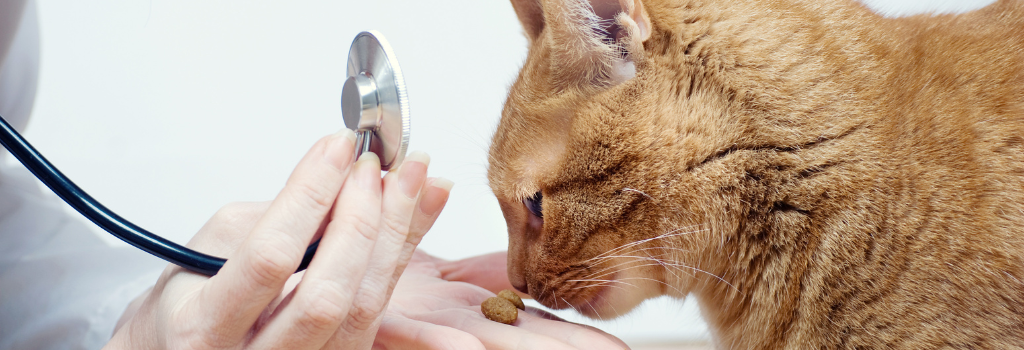Preventive Care for Cats
Cats are famously stoic—often hiding discomfort until a problem becomes advanced. By the time your cat starts hiding, skipping meals, or avoiding interaction, it’s likely that they’ve been uncomfortable for some time. We’re here to provide reliable, medically sound guidance you can trust. Below, we’ve answered some of the most common questions we hear about feline preventive care—and shared what we recommend to help keep your cat healthy, comfortable, and thriving for years to come.
What Is Preventive Care for Cats?
Preventive care is all about staying one step ahead of illness. It includes everything from proper nutrition and parasite prevention to regular wellness exams and dental care.
Key components of feline preventive care:
- Annual wellness exams
- Vaccinations
- Parasite Control (internal and external)
- Blood, urine, and fecal screenings
- Regular Dental Care
- Balanced, species-appropriate nutrition
- Routine grooming and hygiene
- Enrichment and mental stimulation
- Behavior support when needed
How Can Preventive Care Improve My Cat’s Health and Lifespan?
Cats who receive consistent preventive care tend to live longer, healthier lives. Staying on top of vaccines, nutrition, and veterinary visits allows us to catch changes early—often before you notice symptoms at home. Early diagnosis means more treatment options, less invasive care, and better long-term outcomes.
What Preventive Care Do You Recommend at Each Life Stage?
Kittens:
- Kitten visits every 3 to 4 weeks starting at 6 weeks old
- Testing for FIV and FeLV
- Full vaccine series through 16 weeks
- Parasite prevention
- Spay or neuter at 6–8 months
Adult Cats:
- Annual wellness exams
- Core vaccines tailored to lifestyle
- Parasite prevention year-round
- Nutrition and weight monitoring
- Dental cleanings as needed
- Bloodwork
Senior Cats:
- Annual senior exams
- Annual lab work (including thyroid screening)
- Arthritis and mobility support
- Adjustments to diet and lifestyle
- Dental care as needed

Why Are Parasite Prevention and Vaccines So Important?
- Even indoor cats are at risk for fleas, ticks, and intestinal parasites. Fleas can cause skin irritation and anemia, while ticks can transmit dangerous diseases. Products we recommend are tailored to your cat’s lifestyle, and we review them annually for safety and effectiveness.
Vaccines protect your cat—and others—from contagious diseases like:
- Rabies (required by law)
- FVRCP (feline distemper and respiratory viruses)
- FeLV (feline leukemia, especially for kittens or outdoor cats)
What About Grooming and Hygiene?
Cats do groom themselves, but they still benefit from your help. A preventive grooming routine includes:
- Regular brushing (especially for long-haired breeds)
- Nail trims
- Checking ears and skin for issues
- Monitoring for changes in grooming behavior
Cats who stop grooming or begin eliminating outside the litter box may be signaling pain or illness.
How Important Is Nutrition in Preventive Care?
Very. Nutrition affects nearly every aspect of your cat’s health. Obesity is the most common preventable issue we see in adult cats. We’ll help you build a nutrition plan based on your cat’s:
- Life stage (kitten, adult, senior)
- Health conditions (e.g., kidney disease, diabetes)
- Lifestyle (indoor vs. outdoor)
- Ideal weight and activity level
In general, we recommend a high-quality food and measured meals instead of free feeding.
What About Dental Care?
Dental disease affects most cats by age four—but because cats rarely show oral pain, it often goes unnoticed. Preventive dental care includes:
- Annual dental exams and cleanings under anesthesia
- At-home tooth brushing
- Dental treats and toys
Untreated dental disease can cause pain, tooth loss, and systemic infections.
What Conditions Can Be Prevented or Caught Early?
With proper care, we can help prevent or detect early signs of:
- Feline leukemia (FeLV)
- FIV
- Intestinal parasites
- Dental disease
- Diabetes
- Kidney and liver disease
- Hyperthyroidism
- Cancer
What’s the Risk of Skipping Preventive Care?
Without preventive care, your cat is more likely to develop:
- Undiagnosed chronic diseases
- Painful dental issues
- Uncontrolled parasites
- Weight and metabolic problems
Preventive care keeps your cat healthier—and reduces long-term costs by avoiding emergency treatments or late-stage disease management.
Let’s Build a Preventive Care Plan That Works
Whether it’s time for a checkup or you’re looking to take a proactive approach to your cat’s health, we’re here for you. Call (337) 893-8522 to get started.
